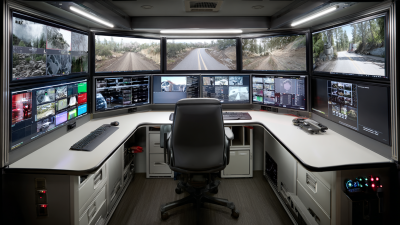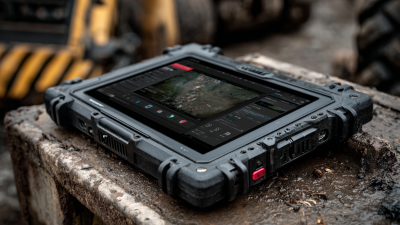How to Choose the Best Rugged Panel Computer for Your Business Needs
As businesses increasingly rely on technology to enhance operational efficiency, the demand for reliable and durable computing solutions has surged. In environments where traditional computers fail to withstand harsh conditions—be it high levels of dust, moisture, or extreme temperatures—rugged panel computers have emerged as a game-changer. According to a report by MarketsandMarkets, the global rugged computing market is projected to reach USD 6.3 billion by 2026, reflecting a compound annual growth rate (CAGR) of 5.4% from 2021. This growth underscores the importance of choosing the right rugged panel computer tailored to specific business needs. From industrial automation to field operations, selecting the most suitable rugged panel computer not only ensures operational continuity but also enhances productivity and worker safety in challenging environments.

Identifying Your Business Environment and Usage Scenarios
When selecting a rugged panel computer for your business, it's crucial to first identify your specific environment and usage scenarios. Different industries have distinct requirements that influence the type of equipment needed. For instance, if your operations take place in manufacturing facilities or warehouses, you may require a model that can withstand dust, moisture, and physical impacts. In contrast, a rugged panel computer used in the field, such as for logistics or utility services, may need enhanced portability and battery life alongside durability.
Additionally, consider the operational conditions where the computer will be deployed. High-temperature environments might necessitate models with extended temperature ranges, while exposure to chemicals may call for additional protective coatings. Understanding these factors helps narrow down options based on resilience features, such as ingress protection ratings and shock resistance. By tailoring your choice to these specific scenarios, you ensure that the rugged panel computer you select will perform reliably, enhancing productivity and efficiency in your business operations.
How to Choose the Best Rugged Panel Computer for Your Business Needs - Identifying Your Business Environment and Usage Scenarios
| Business Environment | Usage Scenario | Key Features | Recommended Specs |
|---|---|---|---|
| Manufacturing | Production line monitoring and control | Dust and waterproof, vibration resistant | Intel i5, 8GB RAM, 256GB SSD |
| Transportation | Fleet management and route optimization | Temperature extremes, sunlight readable | Intel i7, 16GB RAM, 512GB SSD |
| Healthcare | Patient data management and monitoring | Antimicrobial surfaces, easy to disinfect | Intel i5, 8GB RAM, 256GB SSD, WiFi |
| Field Services | On-site inspections and data collection | Rugged, lightweight, long battery life | Intel i5, 8GB RAM, 128GB SSD |
| Retail | Point of Sale and inventory management | Compact, stylish, touch screen | Intel Celeron, 4GB RAM, 64GB eMMC |
Evaluating Key Features for Rugged Panel Computers
When evaluating rugged panel computers for business needs, it's essential to consider the specific features that will ensure durability and functionality in harsh environments. One critical factor is the protection rating, commonly known as IP rating. Choose a panel computer with a higher IP rating to guarantee resistance against dust and moisture. This will safeguard your device in settings prone to spills, debris, or extreme temperatures.
Another vital feature is the display type. Look for screens with high brightness and anti-glare technology, as these improvements enhance visibility in both indoor and outdoor conditions. Consider whether a touch screen interface fits your operation requirements, as it can streamline tasks and improve user interaction in mobile settings.
**Tip**: Always assess the available mounting options for your rugged panel computer. Flexibility in mounting solutions can significantly aid installation in various locations, whether on a vehicle, wall, or workstation.
**Tip**: Don’t overlook the processing power and memory of the device. Ensure that it meets the demands of your applications to avoid slow performance, which could impact service efficiency.
Key Features Comparison of Rugged Panel Computers
Comparing Performance Metrics and Specifications
 When selecting a rugged panel computer for your business, understanding performance metrics and specifications is essential for ensuring it meets your operational needs. According to a recent report from Gartner, rugged devices typically exhibit a performance advantage, often boasting specifications that optimize processing power and energy efficiency, vital for industries such as manufacturing and logistics. For instance, devices with Intel's latest i7 processors can deliver processing speeds of up to 4.6 GHz, significantly enhancing productivity in demanding environments.
When selecting a rugged panel computer for your business, understanding performance metrics and specifications is essential for ensuring it meets your operational needs. According to a recent report from Gartner, rugged devices typically exhibit a performance advantage, often boasting specifications that optimize processing power and energy efficiency, vital for industries such as manufacturing and logistics. For instance, devices with Intel's latest i7 processors can deliver processing speeds of up to 4.6 GHz, significantly enhancing productivity in demanding environments.
In addition to processing power, durability ratings such as IP67 or MIL-STD-810G provide insights into a device’s ability to withstand harsh conditions. Research by VDC Research indicates that businesses utilizing rugged devices report a 30% decrease in repair costs due to their enhanced resilience. Furthermore, advancements in display technologies, such as sunlight-readable screens, improve usability in outdoor applications, which is critical for field operations. Companies should carefully analyze these performance metrics to ensure their rugged panel computers not only meet immediate needs but also provide long-term reliability and efficiency.
Determining Budget Constraints and Cost-Effectiveness
 When choosing a rugged panel computer for your business, budget constraints and cost-effectiveness are crucial factors to consider. Setting a clear budget allows you to filter through various options that fit within your financial means while ensuring you do not sacrifice quality for price. Consider the initial purchase price along with long-term operational costs, such as maintenance, software licenses, and potential upgrades. This holistic approach ensures that the chosen model remains viable over time and aligns with your company's financial strategy.
When choosing a rugged panel computer for your business, budget constraints and cost-effectiveness are crucial factors to consider. Setting a clear budget allows you to filter through various options that fit within your financial means while ensuring you do not sacrifice quality for price. Consider the initial purchase price along with long-term operational costs, such as maintenance, software licenses, and potential upgrades. This holistic approach ensures that the chosen model remains viable over time and aligns with your company's financial strategy.
Tips: When assessing costs, look into warranties and customer support services that may influence long-term expenses. Furthermore, evaluate the total cost of ownership (TCO) instead of just the purchase price. Often, investing slightly more upfront can lead to better durability and lower replacement rates, ultimately saving money in the long run.
Additionally, it’s wise to benchmark against industry standards to ensure you're getting the best value for your money. Research and compare features that matter most to your operations, such as processing power, display quality, and environmental resilience. By conducting thorough research and defining your priorities, you can find a rugged panel computer that meets both budget constraints and your specific business needs effectively.
Assessing Vendor Support and Warranty Options
When selecting a rugged panel computer for your business,
assessing vendor support and warranty options is crucial. A reliable vendor should offer
comprehensive support services, including installation assistance, troubleshooting, and ongoing maintenance.
This ensures that your business minimizes downtime that can occur due to hardware failures or software issues.
Look for vendors that provide timely customer support through various channels, such as phone, email, or live chat.
This accessibility can significantly affect your operational efficiency and overall satisfaction with the product.
Additionally, warranty options play a vital role in
selecting the right rugged panel computer. A robust warranty can provide peace of mind, protecting your investment
against unforeseen defects or failures. It's important to evaluate the length and coverage of the warranty—consider
terms that include parts and labor, as well as coverage for accidental damage, which can be common in rugged environments.
Vendors that offer extended warranty options or service agreements
may be more appealing, as they indicate a commitment to the longevity and reliability of their products. By thoroughly
assessing these factors, you can make an informed decision that aligns with your business needs.
Related Posts
-

Mastering the Industrial Panel PC Revolution for Optimal Manufacturing Efficiency
-

Ultimate Guide to Choosing the Right Rugged Panel PC for Your Business Needs
-

How to Choose the Right Rugged Panel Computer for Your Toughest Environments
-

Solutions for Enhanced Industrial Durability with Rugged Touch Panel PCs in Harsh Environments
-

Ultimate Guide to Rack Mount Computers Enhancing Performance and Efficiency in Data Centers
-

How to Choose the Right Rugged PC for Your Industrial Needs

